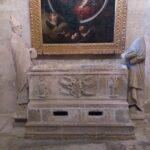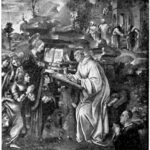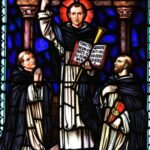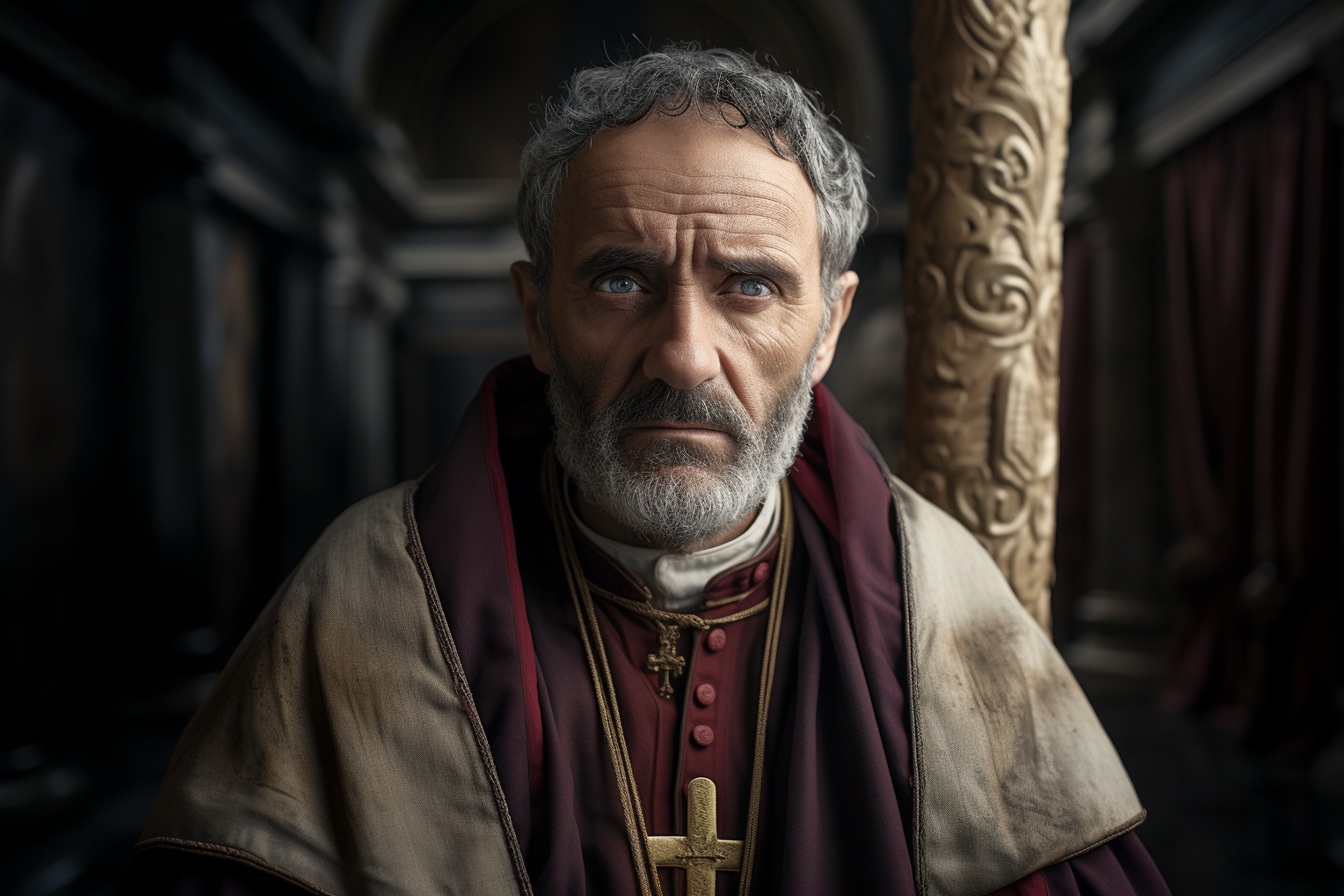
St. Julius
Saint Julius
When They Lived:
St. Julius lived during the 4th century, from around 280 AD to 352 AD.
Where They Lived:
St. Julius resided in Rome, the heart of the Roman Empire, during a time of transition and tumultuous change.
Notable World Events during Their Time:
- Edict of Milan (313 AD): This groundbreaking decree marked the official tolerance of Christianity within the Roman Empire.
- Battle of Adrianople (378 AD): A significant battle that weakened the Roman military might and foreshadowed the eventual collapse of the Western Roman Empire.
- Council of Nicaea (325 AD): An ecumenical council that addressed theological disputes within Christianity and formulated the Nicene Creed.
- Founding of Constantinople (330 AD): Establishment of a new capital city, marking a shift in the center of political power within the Roman Empire.
- Death of Emperor Julian the Apostate (363 AD): The end of efforts to revive pagan practices, reaffirming Christianity’s dominance.
Scientific Discoveries and Notable Figures:
- Ptolemaic System: The prevailing geocentric model of the universe during St. Julius’s lifetime.
- Aryabhata: The Indian mathematician and astronomer who contributed to trigonometry and astronomy.
- Roman Architecture: Continued development of Roman architecture, blending classical and Christian motifs.
Their Patronage:
St. Julius is recognized as the patron saint of hospitality and travelers. His life, emphasizing compassion and openness to strangers, resonates with the modern imperative to foster understanding and harmony in our diverse and evolving global society.
In Brief:
- Pope Saint Julius I defended the Church against Arianism, a heresy denying Christ’s divinity.
- His early life and strong faith prepared him for his election as the 35th Bishop of Rome.
- Arianism emerged in the 4th century, threatening the unity and doctrine of the Church.
- Pope Julius I convened the First Council of Nicaea, guiding the formulation of the Nicene Creed that refuted Arianism.
- His defense demonstrated exemplary leadership, commitment to unity, and dedication to upholding the truth.
- Pope Julius I’s personal piety, especially towards the Eucharist and prayer, inspired others.
- His legacy inspires believers to uphold truth, foster unity, nurture personal piety, lead with humility, and defend orthodoxy.
- Lessons include standing firm in convictions, pursuing unity with love and respect, nurturing spiritual life, leading humbly, and defending orthodox teachings.
Early Life and Papal Election
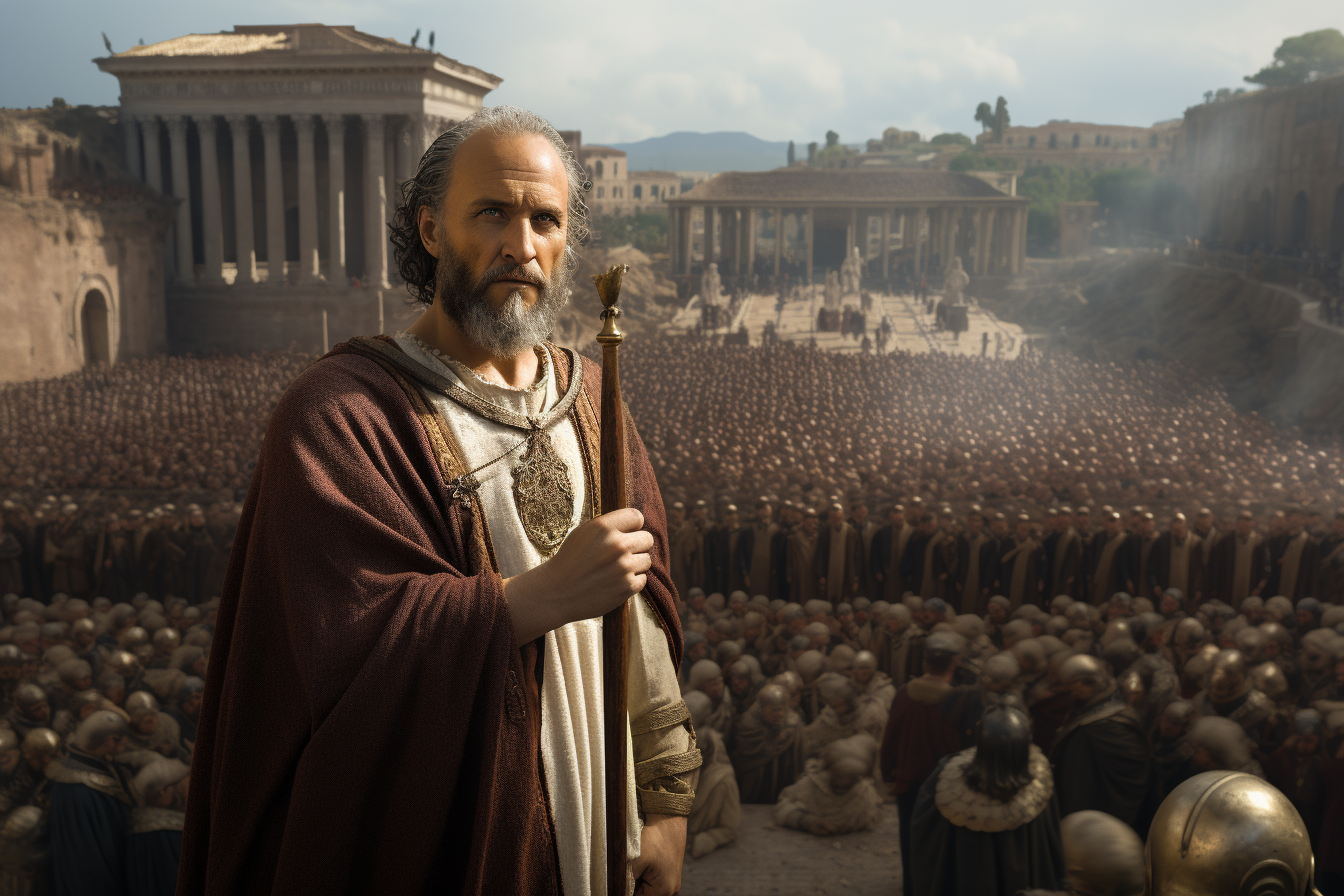
Pope Saint Julius I, a significant figure in Christian history, was born in the 4th century and went on to become the 35th Bishop of Rome, serving as Pope from 337 AD until his death in 352 AD. His early life and journey to the papacy played an essential role in shaping his character and preparing him for the challenges he would later face, particularly in combating the Arian heresy.
Born into a devout Christian family, Julius grew up immersed in the teachings of the Church. He exhibited a strong faith from a young age and dedicated himself to the study of Scripture and theology. His deep knowledge of Christian doctrine and his virtuous character set him apart, earning him respect within the Christian community.
In 337 AD, following the death of Pope Mark, Julius was elected as his successor, becoming the Bishop of Rome and assuming the role of Pope. The election of Pope Julius I came at a crucial time when the Church faced numerous challenges, including the growing influence of Arianism.
The early years of Pope Julius I’s papacy were marked by his commitment to upholding the teachings of the Church and defending the divinity of Christ against the Arians. His election as Pope was a testament to his reputation as a man of strong faith, integrity, and leadership.
Throughout his life, Pope Julius I demonstrated qualities of humility, compassion, and a deep sense of responsibility towards the Church and its faithful. These qualities would become even more apparent in his efforts to combat the spreading Arian heresy and ensure the preservation of orthodox Christian teachings.
Pope Julius I’s early life experiences, along with his steadfast devotion to Christ and deep understanding of Christian doctrine, prepared him for the immense challenges he would face as Pope. His election to the papacy not only served as a recognition of his personal virtues but also reflected the trust placed in him to guide the Church through turbulent times.
As we delve further into Pope Saint Julius I’s life and his role in combating Arianism, we will witness how his unwavering commitment to the truth of the faith, his exemplary leadership, and his personal piety continue to serve as an inspiration and example for believers today.
The Emergence and Spread of Arianism
In order to understand the significance of Pope Saint Julius I’s efforts in combating Arianism, it is essential to grasp the context in which this heresy emerged and spread within the early Christian Church.
Arianism originated in the 4th century and was named after its founder, Arius, a presbyter from Alexandria, Egypt. This heretical movement denied the divinity of Christ and propagated the belief that Jesus, while a remarkable human, was not co-eternal or consubstantial with God the Father. According to Arianism, Jesus was seen as a created being inferior to God.
The rise of Arianism posed a significant threat to the unity and doctrine of the early Christian Church. It gained popularity due to its seemingly rational arguments and attracted followers, including influential bishops and theologians. The heresy spread rapidly, causing divisions and controversies within Christian communities across the Roman Empire.
One of the primary reasons Arianism gained traction was its appeal to those seeking a simpler explanation of the complex mystery of the Trinity. The Arians argued that their beliefs aligned with reason and scriptural interpretations, presenting an alternative to the traditional understanding of Christ’s divinity.
As Arianism continued to spread, it became a source of great concern for Pope Saint Julius I and other orthodox Christian leaders. They recognized the danger it posed to the fundamental teachings of the Church and the salvation of souls. Pope Julius I understood the urgent need to address this heresy and preserve the true faith handed down by the apostles.
The emergence of Arianism necessitated a response from the Church that would establish the orthodox Christian position and counteract the false teachings. Pope Julius I’s unwavering commitment to the truth of the faith, along with his position as Bishop of Rome, provided him with a significant platform to address this crisis.
In the next section, we will delve into Pope Saint Julius I’s defense against Arianism and examine the actions he took to combat this heresy. His efforts, particularly in convening the First Council of Nicaea, would prove instrumental in reaffirming the divinity of Christ and preserving the unity of the Church. Through his resolute stand against Arianism, Pope Julius I serves as an exemplar of courage and steadfastness in the face of doctrinal challenges.
Pope Saint Julius I’s Defense Against Arianism
Pope Saint Julius I’s unwavering commitment to defending the orthodox teachings of the Church led him to take decisive actions in combating the spread of Arianism. His leadership and dedication to preserving the truth of the faith played a crucial role in shaping the course of Christian history.
One of the most significant contributions of Pope Julius I in the fight against Arianism was his pivotal role in convening the First Council of Nicaea in 325 AD. Recognizing the urgent need to address the theological controversies surrounding the divinity of Christ, Pope Julius I saw the council as an opportunity to gather bishops from across the Christian world and affirm the orthodox position.
At the Council of Nicaea, Pope Julius I presided over the gathering of over 300 bishops who represented various regions of the Church. Together, they deliberated on the key issues at hand, with Arianism being the central concern. The council aimed to clarify the true nature of Christ and establish a unified understanding of the Trinity that aligned with apostolic tradition and Scripture.
During the council, Pope Julius I played a vital role in guiding the discussions and ensuring that the orthodox position on the divinity of Christ was upheld. He recognized the danger that Arianism posed to the unity of the Church and the integrity of its teachings. With great wisdom and pastoral care, he emphasized the importance of maintaining the orthodox faith and preserving the unity of the Church.
Under Pope Julius I’s leadership, the council produced the Nicene Creed, a significant statement of faith that affirmed the divinity of Christ and refuted the Arian heresy. The Nicene Creed declared that Jesus Christ was “begotten, not made, consubstantial with the Father,” firmly establishing the eternal and divine nature of Christ.
The decisions made at the First Council of Nicaea marked a turning point in the struggle against Arianism. Pope Julius I’s unwavering commitment to upholding the true faith and his efforts in presiding over the council ensured that the orthodox teachings of the Church prevailed over the heretical doctrines of Arianism.
Pope Julius I’s defense against Arianism extended beyond the council as well. He continued to confront Arian influences and promote the orthodox faith within the Roman Empire. He actively engaged with bishops and clergy, reinforcing the teachings of the council and fostering unity within the Church.
The legacy of Pope Saint Julius I’s defense against Arianism cannot be overstated. His leadership and steadfastness in upholding the orthodox faith played a vital role in preserving the integrity of Christian doctrine. The Nicene Creed, formulated under his guidance, continues to be recited by Christians worldwide, reaffirming the eternal divinity of Christ.
Pope Julius I’s defense against Arianism serves as a powerful example for believers today. His unwavering commitment to the truth of the faith, his leadership in times of theological crisis, and his dedication to unity within the Church all serve as lessons to be emulated. As we navigate the challenges and controversies of our own time, we can draw inspiration from Pope Saint Julius I’s example and strive to defend and uphold the orthodox teachings of the Christian faith.
Pope Saint Julius I’s Defense Against Arianism
Pope Saint Julius I’s unwavering commitment to defending the orthodox teachings of the Church led him to take decisive actions in combating the spread of Arianism. His leadership and dedication to preserving the truth of the faith played a crucial role in shaping the course of Christian history.
One of the most significant contributions of Pope Julius I in the fight against Arianism was his pivotal role in convening the First Council of Nicaea in 325 AD. Recognizing the urgent need to address the theological controversies surrounding the divinity of Christ, Pope Julius I saw the council as an opportunity to gather bishops from across the Christian world and affirm the orthodox position.
At the Council of Nicaea, Pope Julius I presided over the gathering of over 300 bishops who represented various regions of the Church. Among the notable saints who attended the council were Saint Athanasius, the great defender of orthodoxy against Arianism, and Saint Nicholas of Myra, known for his generosity and as the inspiration behind the figure of Santa Claus. These and other esteemed bishops united under Pope Julius I’s leadership to confront the Arian heresy and defend the true faith.
Together, they deliberated on the key issues at hand, with Arianism being the central concern. The council aimed to clarify the true nature of Christ and establish a unified understanding of the Trinity that aligned with apostolic tradition and Scripture.
During the council, Pope Julius I played a vital role in guiding the discussions and ensuring that the orthodox position on the divinity of Christ was upheld. He recognized the danger that Arianism posed to the unity of the Church and the integrity of its teachings. With great wisdom and pastoral care, he emphasized the importance of maintaining the orthodox faith and preserving the unity of the Church.
Under Pope Julius I’s leadership, the council produced the Nicene Creed, a significant statement of faith that affirmed the divinity of Christ and refuted the Arian heresy. The Nicene Creed declared that Jesus Christ was “begotten, not made, consubstantial with the Father,” firmly establishing the eternal and divine nature of Christ.
The decisions made at the First Council of Nicaea marked a turning point in the struggle against Arianism. Pope Julius I’s unwavering commitment to upholding the true faith and his efforts in presiding over the council ensured that the orthodox teachings of the Church prevailed over the heretical doctrines of Arianism.
Pope Julius I’s defense against Arianism extended beyond the council as well. He continued to confront Arian influences and promote the orthodox faith within the Roman Empire. He actively engaged with bishops and clergy, reinforcing the teachings of the council and fostering unity within the Church.
The legacy of Pope Saint Julius I’s defense against Arianism cannot be overstated. His leadership and steadfastness in upholding the orthodox faith played a vital role in preserving the integrity of Christian doctrine. The Nicene Creed, formulated under his guidance, continues to be recited by Christians worldwide, reaffirming the eternal divinity of Christ.
Pope Julius I’s defense against Arianism, alongside the notable saints who attended the First Council of Nicaea, serves as a powerful example for believers today. Their unwavering commitment to the truth of the faith, their leadership in times of theological crisis, and their dedication to unity within the Church all serve as lessons to be emulated. As we navigate the challenges and controversies of our own time, we can draw inspiration from Pope Saint Julius I, Saint Athanasius, Saint Nicholas of Myra, and the other esteemed bishops who defended orthodoxy at the Council of Nicaea and strive to defend and uphold the orthodox teachings of the Christian faith.
Exemplary Leadership and Unity
Pope Saint Julius I’s defense against Arianism was not only marked by his theological acumen but also by his exemplary leadership and unwavering commitment to unity within the Church. In the face of doctrinal disputes and challenges to the orthodox faith, Pope Julius I demonstrated qualities of courage, humility, and a deep sense of responsibility towards the well-being of the Christian community.
During his papacy, Pope Julius I faced significant divisions caused by the spread of Arianism. Despite the challenges, he remained steadfast in his efforts to preserve the unity of the Church. Recognizing the importance of a united front against heresy, he worked diligently to maintain open lines of communication and foster dialogue among bishops and clergy throughout the Roman Empire.
Pope Julius I understood that unity within the Church was not only a matter of doctrinal agreement but also a reflection of the love and harmony that should characterize the body of Christ. He emphasized the need for mutual respect, charity, and a shared commitment to upholding the orthodox faith.
In his interactions with bishops and theologians, Pope Julius I exemplified humility and a willingness to listen to various perspectives. He sought to resolve disputes through dialogue and sought the guidance of the Holy Spirit in discerning the truth. His leadership style was marked by a desire to maintain unity without compromising the essential teachings of the Church.
Pope Julius I’s commitment to unity extended beyond the Christian community in Rome. He actively engaged with bishops and clergy from various regions, recognizing the importance of collaboration and mutual support in addressing the challenges posed by Arianism. Through his diplomatic efforts, he sought to build bridges and foster a spirit of cooperation among the bishops.
In addition to his role as a unifying figure, Pope Julius I demonstrated a resolute determination to uphold the orthodox faith. He understood that the preservation of sound doctrine was essential for the spiritual well-being of the faithful and the overall health of the Church. His unwavering commitment to the truth of the faith served as a guiding light during a time of theological confusion and controversy.
Pope Saint Julius I’s exemplary leadership and dedication to unity serve as an inspiration for us today. In a world marked by divisions and disagreements, his example calls us to prioritize unity within the Church while remaining steadfast in upholding the teachings of Christ and the apostles. Pope Julius I reminds us of the importance of humility, dialogue, and the pursuit of truth in the face of challenges to the faith.
As we navigate the complexities of our modern world, we can draw upon the legacy of Pope Saint Julius I to guide our own leadership roles within the Church. His example encourages us to approach disagreements with charity and respect, to prioritize the unity of the body of Christ, and to remain steadfast in upholding the orthodox teachings of the faith.
Personal Piety and Devotion
Pope Saint Julius I’s defense against Arianism was not solely a result of his leadership and intellectual prowess but also rooted in his personal piety and deep devotion to Christ. His exemplary spiritual life and dedication to the sacraments served as a source of inspiration and strength in his role as Pope.
Throughout his papacy, Pope Julius I exhibited a profound reverence for the Eucharist, recognizing it as the true body and blood of Christ. He upheld the importance of the sacraments in nourishing the faithful and fostering their spiritual growth. His own participation in the Eucharistic liturgy and his encouragement of the faithful to partake in the sacraments exemplified his deep faith and understanding of their significance.
In addition to his devotion to the Eucharist, Pope Julius I demonstrated a strong commitment to prayer. He recognized the need for continual communion with God, seeking guidance and strength through his intimate relationship with the Lord. Prayer was not merely a duty but a way of life for Pope Julius I, allowing him to discern God’s will and persevere in his mission to defend the orthodox faith.
Pope Julius I’s personal piety and devotion to Christ were not confined to public ceremonies or official duties. He led a life of humility and simplicity, recognizing that true greatness lies in service to others. He lived out the teachings of Christ by caring for the poor, showing compassion to the marginalized, and extending mercy to those in need.
His personal example of holiness and virtue inspired those around him and contributed to the unity and strength of the Church during a time of theological turmoil. Pope Julius I’s genuine love for Christ and his unwavering commitment to the teachings of the Church served as a beacon of hope and an example for all believers.
Today, Pope Saint Julius I’s life of personal piety and devotion continues to serve as a model for Christians. His deep love for the Eucharist reminds us of the central role of the sacraments in our spiritual lives. His commitment to prayer teaches us the importance of maintaining a personal relationship with God. And his dedication to serving others challenges us to live out our faith in acts of love and mercy.
In a world that often seeks distractions and instant gratification, Pope Julius I’s example reminds us of the enduring value of a life centered on Christ and rooted in prayer. As we strive to defend the faith and promote unity, let us also cultivate a personal piety and devotion that nourishes our souls and inspires those around us. Pope Saint Julius I’s legacy serves as a reminder that personal holiness is not only attainable but essential for the Church to flourish and for the Gospel to be proclaimed effectively.
Legacy and Lessons for Today
The legacy of Pope Saint Julius I, particularly his defense against Arianism, continues to resonate within the Christian Church. His unwavering commitment to the truth of the faith and his exemplary life serve as a source of inspiration and offer valuable lessons for believers today.
Pope Julius I’s defense against Arianism left a lasting impact on the Church by preserving the integrity of Christian doctrine. Through his leadership and the convening of the First Council of Nicaea, he helped establish the Nicene Creed, which remains a fundamental statement of faith for Christians worldwide. The Creed affirms the divinity of Christ and stands as a testimony to the Church’s steadfastness in upholding orthodox teachings.
The challenges faced by the early Church, including the spread of heresy, are not unfamiliar to us today. In a world filled with various ideologies and conflicting beliefs, Pope Saint Julius I’s life offers valuable lessons:
- Upholding Truth: Pope Julius I’s unwavering commitment to the truth of the faith reminds us of the importance of standing firm in our convictions. In the face of cultural pressures and relativism, we are called to boldly proclaim the orthodox teachings of the Church, rooted in Scripture and apostolic tradition.
- Fostering Unity: Pope Julius I’s efforts to maintain unity within the Church teach us the importance of working together in love and charity. Despite differences of opinion, unity must be sought through dialogue, respect, and a shared commitment to the essentials of the faith. Our pursuit of unity strengthens the witness of the Church in a divided world.
- Personal Piety: Pope Julius I’s deep devotion to Christ and personal piety serve as a reminder of the importance of nurturing our own spiritual lives. Through prayer, sacramental participation, and acts of charity, we can cultivate a vibrant faith that strengthens us to face challenges and reflect the love of Christ to others.
- Leadership with Humility: Pope Julius I’s humble leadership style, characterized by listening, dialogue, and seeking the guidance of the Holy Spirit, teaches us the importance of humility in our roles within the Church. Leadership should be marked by service, a willingness to learn from others, and a commitment to discerning God’s will.
- Defending Orthodoxy: Pope Julius I’s defense against Arianism illustrates the need for vigilance in preserving the integrity of Christian doctrine. We are called to be guardians of the faith, actively countering false teachings and standing firm on the foundations of orthodoxy.
Pope Saint Julius I’s life and example remind us that the struggles faced by the early Church were not distant events but ongoing challenges that we, as believers, encounter in our own time. By drawing inspiration from his legacy, we can navigate the complexities of our modern world with faith, conviction, and a steadfast commitment to the truth of the Gospel.
As we reflect on the life of Pope Saint Julius I, let us be encouraged to embrace his virtues and teachings and to follow his example of defending the faith, fostering unity, and living a life of holiness. By doing so, we honor his legacy and contribute to the ongoing mission of the Church in proclaiming the transformative power of the Gospel to the world.

